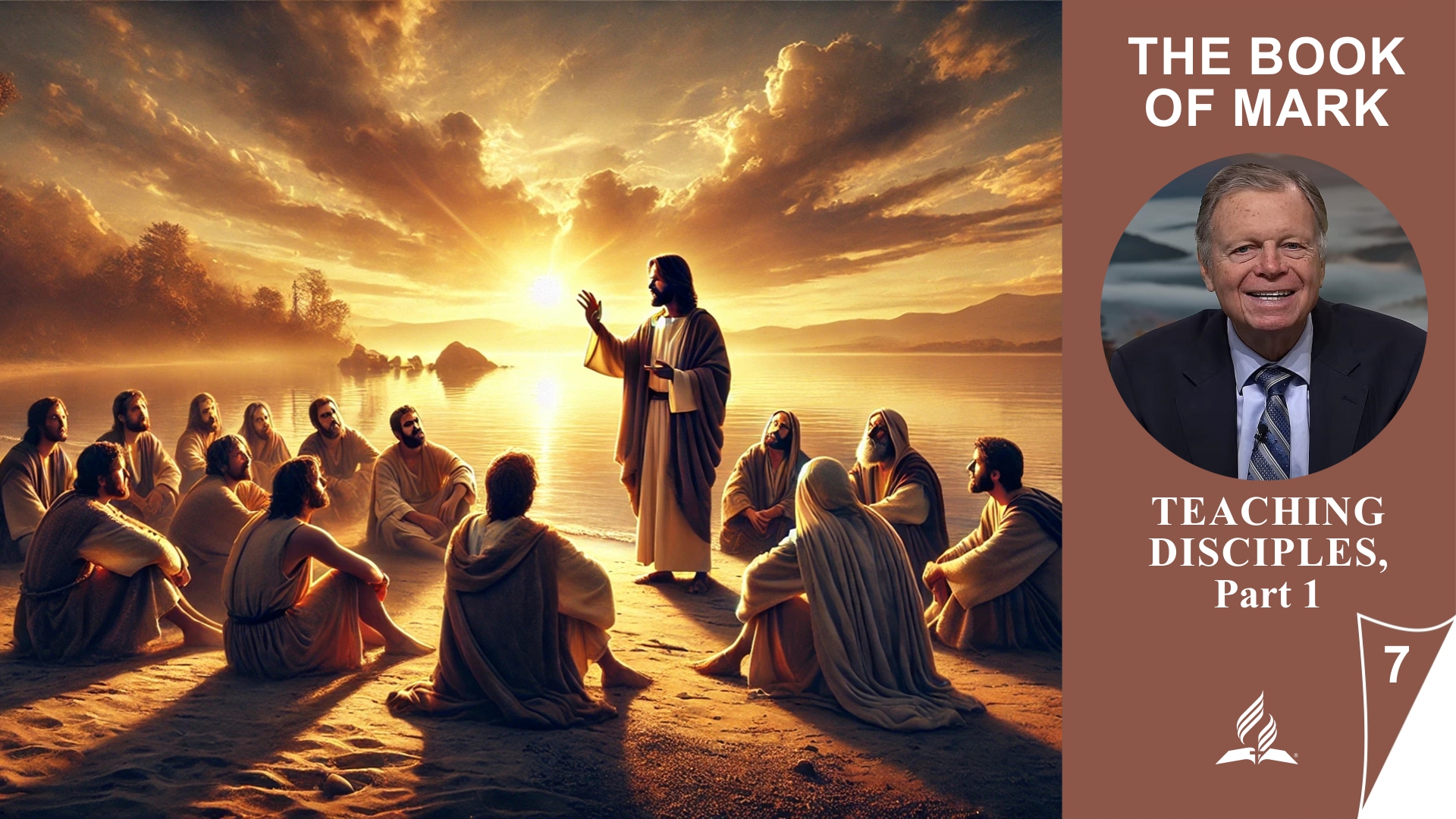
The Book of Mark – Lesson 6.Inside Out | Sabbath School with Pastor Mark Finley
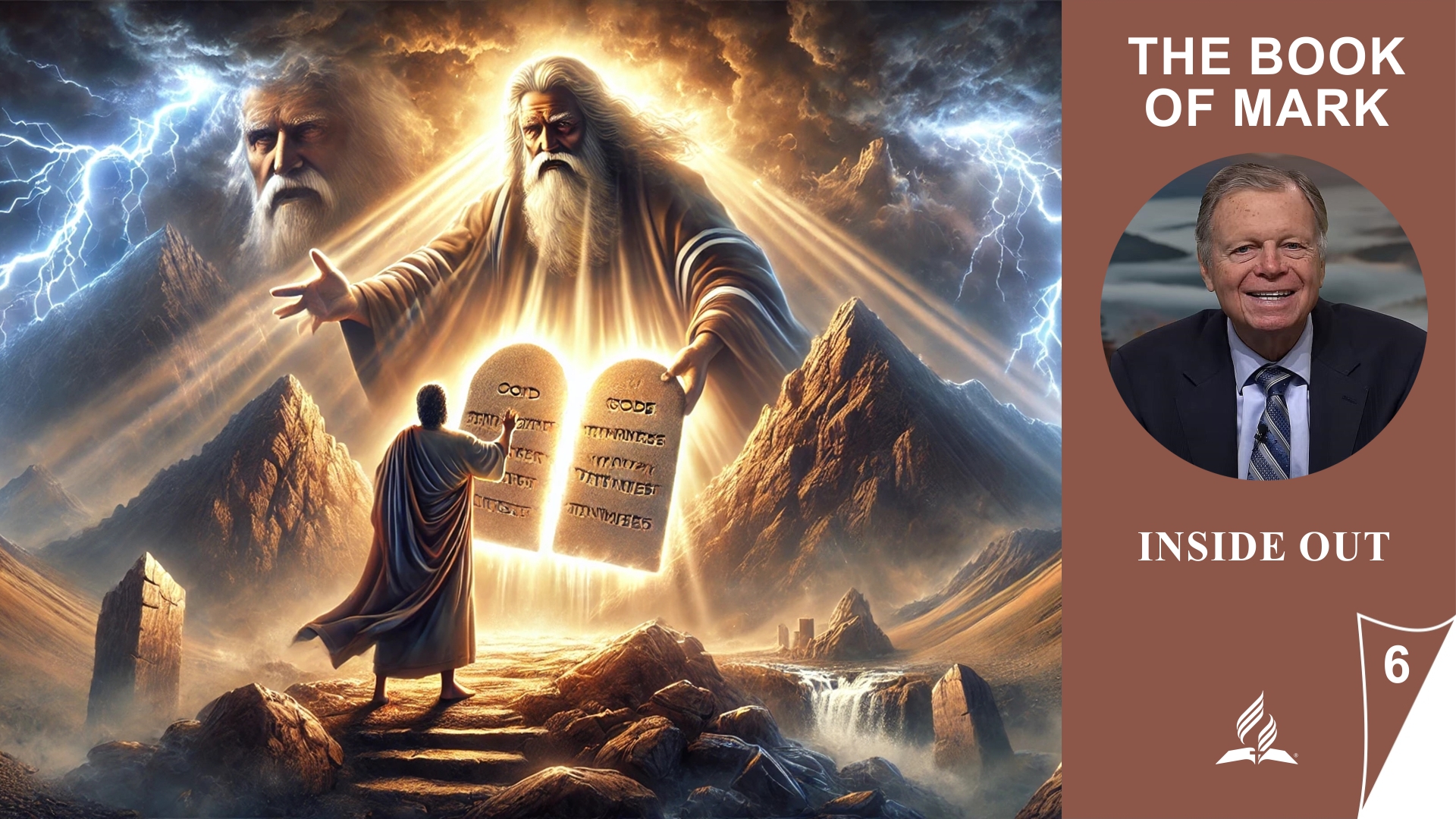
Series THE BOOK OF MARK with Pastor Mark Finley |
Lesson 6.Inside Out |
God’s Commandments Over Traditions: The True Source of Purity and Faith |
Lesson 6 explores the challenge that arises when human traditions conflict with divine commandments. Through various encounters in Mark 7 and 8, Jesus demonstrates that true purity and faith are determined not by outward rituals but by the heart. He confronts the Pharisees with their hypocrisy, praises the faith of a foreign woman, and warns his disciples against the false teachings of religious leaders. This lesson invites reflection on prioritizing God’s commandments over human traditions in one’s spiritual life.
Memory Text: Mark 7:15 – “ ‘There is nothing that enters a man from outside which can can defile him; but the things which come out of him, those are the things that defile a man’.”
Content:
6.1 Human Traditions Versus God’s Commandments
True Piety: God’s Commandments Over Human Traditions
In Mark 7:1-13, a significant principle is highlighted regarding the relationship between human traditions and God’s commandments. Jesus confronts the Pharisees, who focus more on ritual traditions than on the actual commandments of God. He points out that external rituals, like handwashing, are not central to faith, but rather the inner attitude towards God is. Jesus criticizes the practice of placing human traditions above divine commandments, especially when these traditions undermine God’s actual laws, as in the case of neglecting parents through the Corban law. Thus, He clarifies that true piety lies not in merely following traditions but in obedience to God’s commandments.
6.2 Clean Hands or Clean Heart?
What Really Matters?
In Mark 7:14-19, Jesus emphasizes that purity is not determined by external rituals or the type of food, but by the condition of the heart. He explains that what enters the body does not defile a person, as it does not reach the heart, but rather the evil that comes from within makes a person impure. This means that true purity is a matter of the heart and inner morality, not of external rituals. Jesus does not abolish the dietary laws but criticizes the Pharisaic tradition that prioritizes external rituals over inner piety.
6.3 Crumbs for the Dogs
Faith Knows No Boundaries: The Lesson of the Canaanite Woman
In Mark 7:24-30, Jesus encounters a Canaanite woman who begs for healing for her daughter. His seemingly harsh response, in which He uses the imagery of a dog, tests the woman. However, her humble and persistent reply reveals her deep faith and understanding that even the “crumbs” from God’s table are enough to perform miracles. Through this dialogue, Jesus shows that faith, not heritage, is the key criterion for accessing God’s grace. In the end, Jesus acknowledges her faith and heals her daughter, illustrating that God’s grace transcends all boundaries.
6.4 Tongue-tied
The Power of Touch: Jesus’ Healing of the Deaf and Mute Man
In Mark 7:31-37, a deaf man with a speech impediment is brought to Jesus, and He heals him in a very personal and direct way. Jesus takes the man aside, touches his ears and tongue, and sighs before performing the miracle. Jesus’ sigh reflects His deep concern over the spiritual deafness and unwillingness of many to accept the truth. Through this miracle, Jesus not only reveals His power to heal physical ailments but also His willingness to free those who are willing to turn to Him and confess their faith.
6.5 Watch Out for Bad Bread
Beware of False Influence: Jesus’ Warning About the Leaven of the Pharisees
In Mark 8:11-13, Jesus expresses deep disappointment with the unbelieving attitude of the Pharisees, who still demand a sign from heaven despite numerous miracles. Jesus refuses to give them this sign, as their lack of faith cannot be overcome by more miracles. Later, He warns His disciples about the “leaven” of the Pharisees and Herod, symbolizing their corrupt teachings. The disciples, however, misunderstand this as a remark about the lack of bread, prompting Jesus to remind them of His previous miracles to correct their spiritual blindness and lack of understanding.
6.6 Summary
The Heart Over Tradition: Jesus’ Teachings on True Purity and Faith
Lesson 6 addresses the conflict between human traditions and divine commandments, as described in Mark 7 and 8. Jesus makes it clear that true purity comes from the heart and is not achieved through ritual actions. He shows that faith and humility are more important than outward traditions, as in the case of the Canaanite woman, who receives healing for her daughter despite apparent rejection. Additionally, He warns His disciples about the corrupt teachings of the Pharisees and emphasizes the importance of recognizing God’s power and grace. The lesson encourages prioritizing inner faith over external rituals.
The Book of Mark – Lesson 5.Miracles Around the Lake | Sabbath School with Pastor Mark Finley
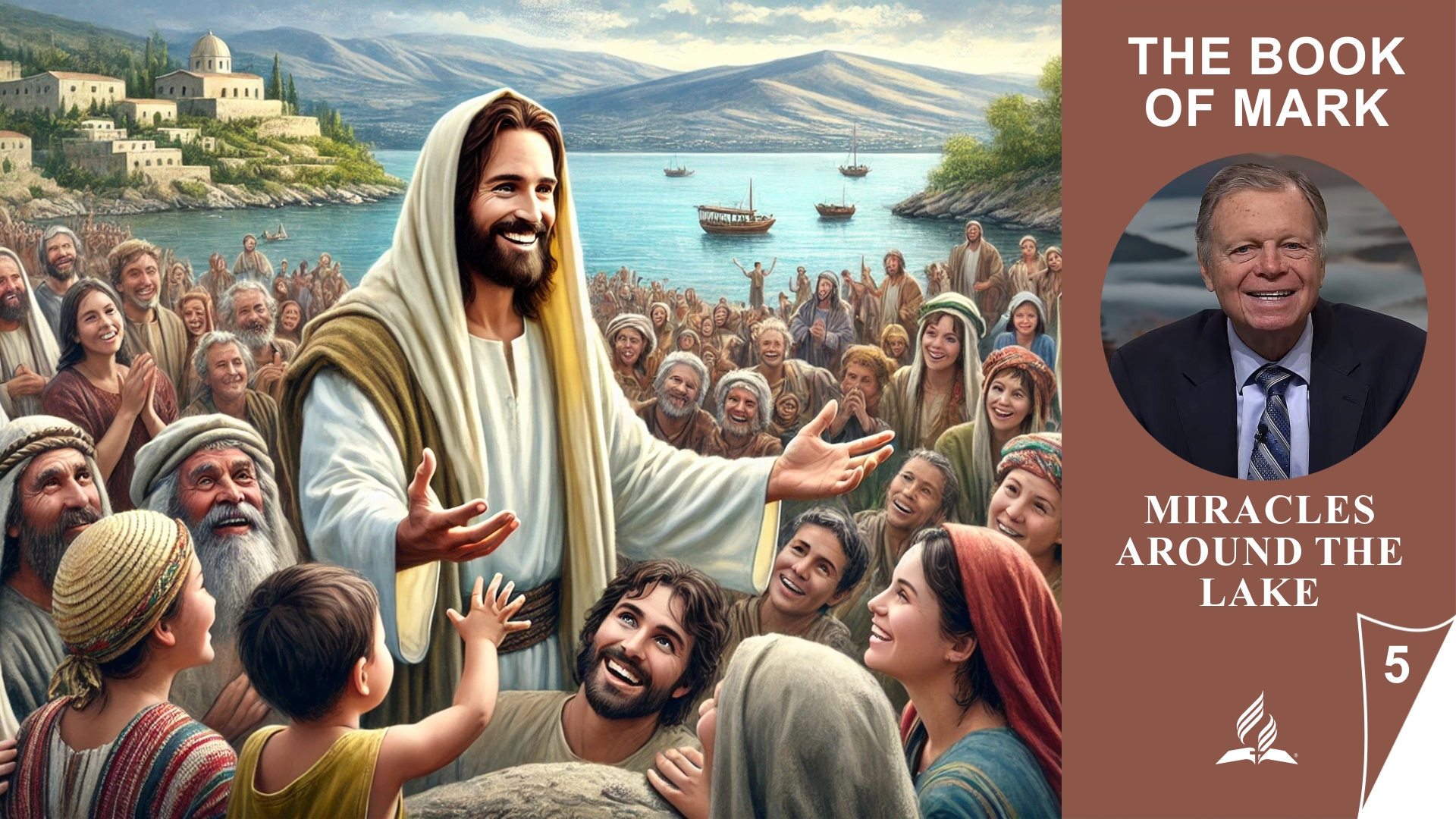
Series THE BOOK OF MARK with Pastor Mark Finley |
Lesson 5.Miracles Around the Lake |
Jesus’ Miracles at the Sea of Galilee: Revelation of His Divine Power and Mercy |
Lesson 5 focuses on the extraordinary miracles Jesus performed around the Sea of Galilee and their profound meanings. These stories demonstrate Jesus’ divine power over nature, illness, and evil spirits. We witness Him calming a storm, healing a demon-possessed man, and feeding 5,000 people with only a few loaves and fishes. Moreover, His walking on water showcases His authority over the elements. These miracles reveal not only His power but also His compassion and mission to spiritually redeem people.
Memory Text: Mark 5:19 – “However, Jesus did not permit him, but said to him, ‘Go home to your friends, and tell them what great things the Lord has done for you, and how He has had compassion on you’.”
Content:
5.1 Calming a Storm
Jesus’ Power Over Nature: Calming the Storm as a Sign of His Divinity
In Mark 4:35-41, the disciples experience a dramatic demonstration of Jesus’ divine power when He calms a violent storm. After a long day of teaching, Jesus, tired, sleeps in the boat while the storm rages. When the disciples panic and wake Him, He commands the wind and waves to be still, and a great calm ensues. This act shows that Jesus has power over the forces of nature, as described in Psalm 104:1-9, a characteristic of Yahweh. The disciples’ reaction—fear and amazement at His authority—helps the reader recognize that Jesus is the Son of God, who has control over creation. This story encourages us to trust in Jesus’ divine power and care in times of fear.
5.2 Can You Hear a Whisper Above a Shout?
The Quiet Power of Jesus: Hearing the Whisper for Help Over the Scream of Demons
In Mark 5:1-20, Jesus encounters a demon-possessed man living among the tombs, who cannot be restrained by anyone. Despite the demons’ loud resistance, Jesus perceives the man’s silent plea for help. By casting out the demons, Jesus displays His unparalleled power over evil. The demons, recognizing Jesus as the Son of God, flee into a herd of pigs, which then plunge into the sea. This story highlights the great battle between good and evil and shows that Jesus brings healing and deliverance even amidst chaos and impurity.
5.3 On the Roller Coaster With Jesus
The Desperate Plea: Jairus Kneels Before Jesus to Beg for Help for His Dying Daughter
In Mark 5:21-24, Jairus, a synagogue leader, shows remarkable faith and humility. Despite his position and the general hostility of religious leaders towards Jesus, Jairus desperately kneels before Jesus and asks for healing for his dying daughter. His actions demonstrate his deep love as a father and his belief in Jesus’ ability to help. Jesus responds immediately and goes with Jairus without hesitation. This scene emphasizes the urgency and faith that motivate Jairus to seek Jesus’ help, despite potential social repercussions.
5.4 Rejection and Reception
Rejection in Nazareth: The Difficulty of Accepting Jesus as Teacher and Healer
In Mark 6:1-6, the people of Jesus’ hometown, Nazareth, reject Him because they know Him only as the carpenter and Mary’s son. They are surprised and offended by His transformation into a teacher and healer and cannot accept His wisdom and power. There is also some hostility since Jesus performed most of His miracles in Capernaum and had conflicts with His family.
In contrast, Mark 6:7-30 describes the sending out of the twelve apostles to spread Jesus’ message and the beheading of John the Baptist. While the disciples travel lightly and rely on people’s support, John ends up isolated and brutally executed. John’s death highlights the danger and suffering Jesus’ followers may also face, hinting at the upcoming crisis for Jesus Himself.
5.5 A Different Kind of Messiah
A Different Kind of Messiah: Jesus’ Miraculous Feeding of the 5000 and the Revelation of His True Mission
In Mark 6:34-52, Jesus and His disciples face the challenge of feeding a large crowd of 5,000 people. While the disciples want to send the crowd away to fend for themselves, Jesus solves the problem by miraculously multiplying five loaves and two fish to feed everyone. This account reflects the expectations of a Messiah who would liberate and lead Israel, but Jesus reveals a different kind of Messiah. Instead of political power, He shows spiritual care and revelation by withdrawing to pray and later walking on water, underscoring His divine nature.
5.6 Summary
Jesus’ Divine Power and Compassion at the Sea of Galilee
Lesson 5 describes various miracles around the Sea of Galilee that reveal Jesus’ divine power and compassion. Jesus calms a storm, demonstrating His authority over nature, which awes His disciples. He heals a demon-possessed man, showing His power over evil. In feeding the 5,000, He reveals His ability to provide in times of need while correcting false Messianic expectations. Finally, Jesus walks on water, highlighting His divine nature and astonishing His disciples once more. These miracles illustrate that Jesus is not just a teacher but the Son of God, who came to spiritually redeem people.
The Book of Mark – Lesson 4.Parables | Sabbath School with Pastor Mark Finley
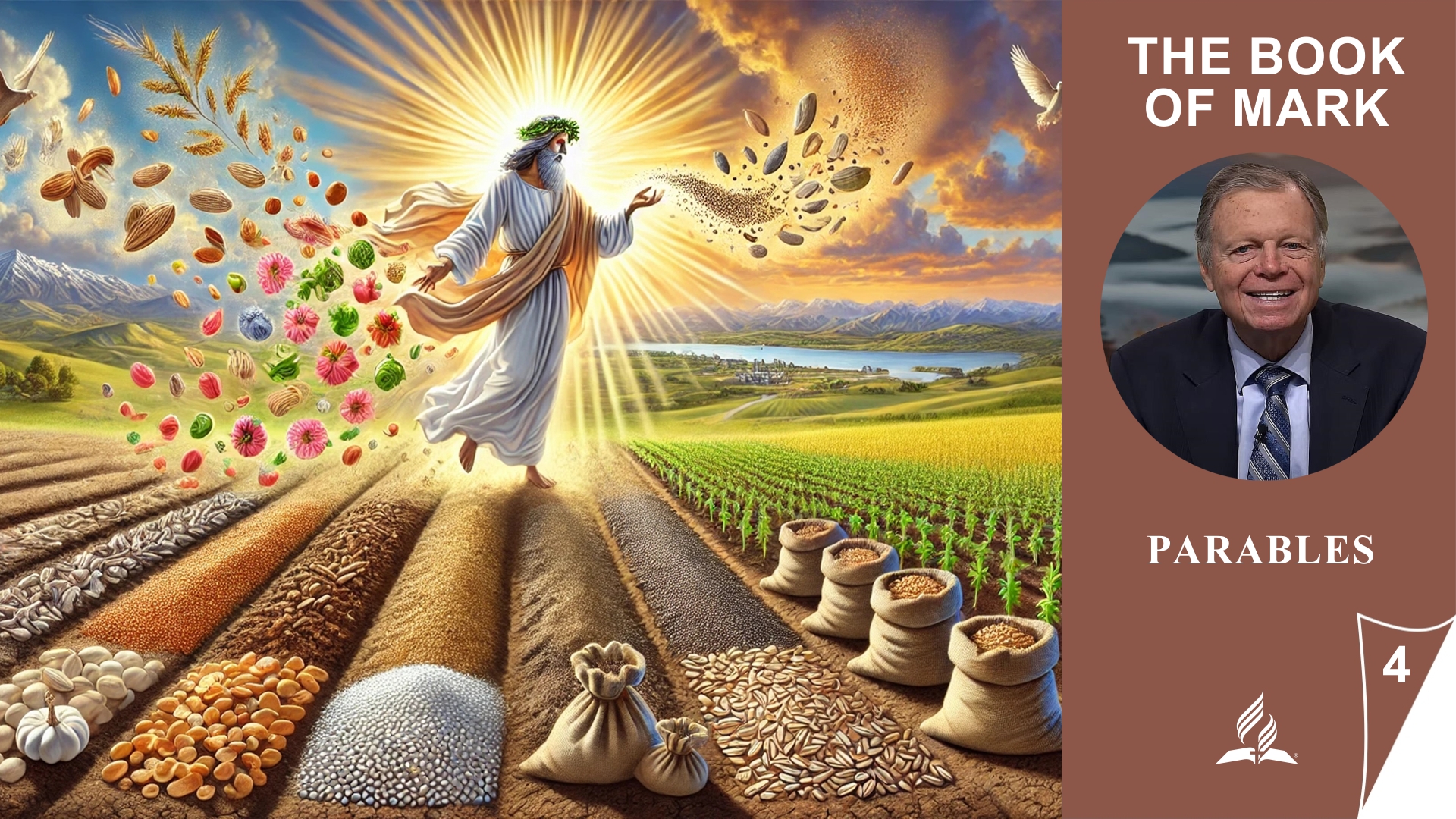
Series THE BOOK OF MARK with Pastor Mark Finley |
Lesson 4.Parables |
The Revelation of the Kingdom of God through Jesus’ Parables
Lesson 4 examines Jesus’ parables in the Gospel of Mark and their deeper significance for the Kingdom of God. These vivid stories, such as the Parable of the Sower, the Lamp, the Growing Seed, and the Mustard Seed, convey central spiritual truths. They illustrate how people respond to God’s word and how the Kingdom of God is based on divine growth. Through these parables, Jesus teaches the principles of faith and the dynamics of divine action. The lesson invites us to understand Jesus’ message and be open to the transformative potential of the gospel.
Memory Text: Mark 4:24.25 – “Then He said to them, ‘Take heed what you hear. With the same measure you use, it will be measured to you; and to you who hear, more will be given. For whoever has, to him more will be given; but whoever does not have, even what he has will be taken away from him’.”
Content:
4.1 The Parable of the Sower
The Importance of Receptivity for the Success of God’s Word
The Parable of the Sower in Mark 4:1-9 describes four types of soil on which the seed falls and the respective fate of the seeds. The seed that falls on the path is immediately eaten by birds. The seed on rocky ground sprouts quickly but withers due to lack of roots. The seed among thorns is choked and cannot thrive. Finally, the seed on good soil yields a rich harvest. This parable emphasizes that the effectiveness of God’s word greatly depends on the receptivity of the hearer’s heart. It highlights the challenges and risks of following Jesus, but also the rich rewards of a fruitful life of faith.
4.2 Jesus’ Interpretation
Jesus’ Explanation of the Parable of the Sower
After telling the Parable of the Sower to a large crowd, Jesus explained it later to a smaller group (Mark 4:13-20). Jesus identifies the seed as “the word of God” and the various soils as different types of listeners. The seed on the path symbolizes people from whom Satan takes away the word before it can take root. The rocky ground represents those who joyfully receive the word but quickly fall away when difficulties arise. The soil with thorns signifies those who hear the word but are choked by worldly worries and riches. Only the good soil symbolizes those who hear, accept, and bear fruit from the word.
4.3 The Reason for the Parables
The Purpose of Jesus’ Parables
Jesus taught in parables to convey deeper spiritual truths that only those open to his message could understand (Mark 4:10-12). At first glance, it might seem that Jesus wanted to keep outsiders in the dark. However, this interpretation does not align with his compassionate and clear actions elsewhere in the Gospel of Mark. In Mark 4, Jesus references Isaiah 6 to illustrate that people often fail to understand due to their own hardness of heart and prejudices. These parables challenge listeners to engage seriously with Jesus’ teachings and to be open to God’s will. Ultimately, understanding depends on the willingness to be transformed by Jesus and his word.
4.4 Lamp and Measuring Basket
Openness and Receptivity to the Truth
In the Parable of the Lamp (Mark 4:21-23), Jesus emphasizes that a lamp is meant to give light and not to be hidden. This symbolizes the truth and the gospel, which should be brought to light and made accessible to all. The absurd questions Jesus poses highlight that it would be pointless to hide a lamp, just as it would be pointless to hide the truth about the Kingdom of God. Jesus means that his message should not remain hidden but be openly proclaimed. He also encourages listeners to pay close attention, as those who accept the light of truth will receive even more, while those who reject it will lose even what they have (Mark 4:24-25).
4.5 Parables of Growing Seed
Growth and Greatness of the Kingdom of God
In the Parable of the Growing Seed (Mark 4:26-29), Jesus emphasizes the natural growth process of the Kingdom of God, which occurs independently of human intervention. The person sows the seed and harvests, but the actual growth is God’s work. This parable underscores that the Kingdom of God has a divine dynamic and does not grow endlessly but reaches a certain climax – the harvest, symbolizing the end of the world.
In the Parable of the Mustard Seed (Mark 4:30-32), the focus is on how something very small grows into something great. The tiny mustard seed that becomes a large plant symbolizes the Kingdom of God, which starts small but grows tremendously. This metaphor shows that despite its humble beginnings, the Kingdom of God will have a significant and worldwide impact. Jesus illustrates that the Kingdom of God, like the mustard seed, possesses an overwhelming and transformative power that exceeds all expectations.
4.6 Summary
Revelation and Growth of the Kingdom of God
Lesson 4 deals with Jesus’ parables in the Gospel of Mark, which convey profound spiritual truths. In the Parable of the Sower (Mark 4:1-20), different types of listeners are represented by various soils, with only the good soil bearing fruit. The Parable of the Lamp (Mark 4:21-25) emphasizes that the truth should come to light and openness to the gospel is rewarded. In the Parable of the Growing Seed (Mark 4:26-29), Jesus shows that the Kingdom of God is based on divine growth, independent of human intervention. Finally, the Parable of the Mustard Seed (Mark 4:30-32) illustrates how the Kingdom of God grows from small beginnings into something great. These parables highlight the principles of the Kingdom of God and the necessity of being open and receptive to its message.
The Book of Mark – Lesson 3.Controversies | Sabbath School with Pastor Mark Finley
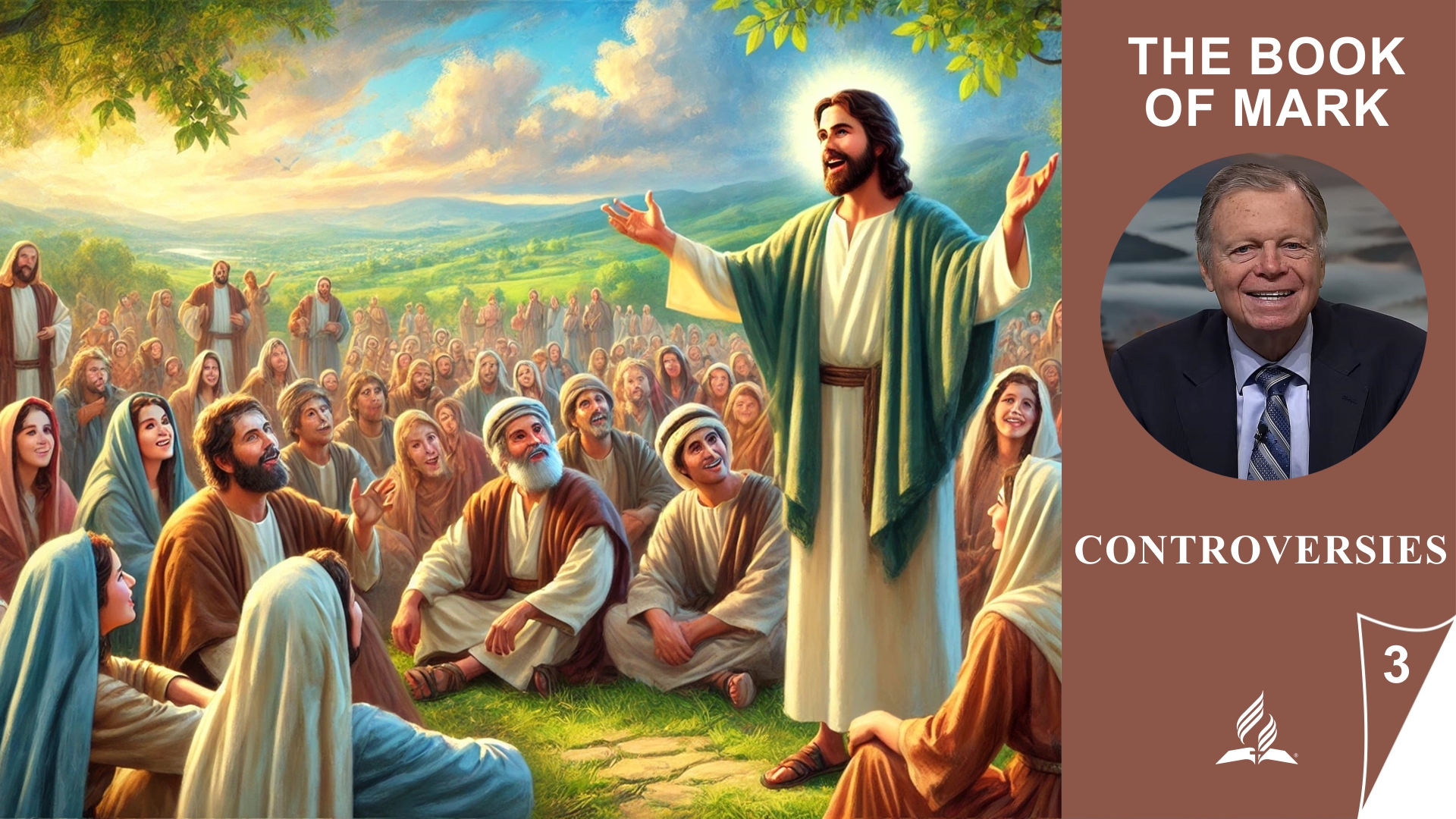
Series THE BOOK OF MARK with Pastor Mark Finley |
Lesson 3.Controversies |
The Controversies Surrounding Jesus’ Ministry
Lesson 3 examines the controversies that surrounded Jesus during his ministry. This lesson highlights how Jesus repeatedly clashed with the religious leaders of his time because he challenged their traditional views. Examples include healing on the Sabbath, the calling of Levi, and discussions about fasting. Each of these stories reveals Jesus’ deeper message of mercy and justice. These controversies make it clear that Jesus came to fulfill the true intent of God’s laws and show people a new way.
Memory Text: Mark 2:27.28 – “And He said to them, ‘The Sabbath was made for man, and not man for the Sabbath. Therefore the Son of Man is also Lord of the Sabbath’.”
Content:
3.1 Healing a Paralytic
Faith, Healing, and the Power of Forgiveness
The paralytic sought healing from Jesus and was brought to him by four friends full of faith. This faith was evident in their determined actions to open the roof and lower their friend to Jesus. Jesus recognized their faith and first forgave the paralytic’s sins, which outraged the religious leaders as they considered it blasphemy. To affirm his divine authority, Jesus then physically healed the paralytic, enabling him to stand and walk. This demonstrated that Jesus had the power to forgive sins and provide physical healing, challenging the narrow religious views of the leaders. The narrative illustrates how genuine faith and God’s work manifest in visible actions.
3.2 Calling Levi and the Question of Fasting
The Calling of Levi and Jesus’ Teaching on Fasting
Levi, the son of Alphaeus, was a despised tax collector known for collaborating with the Romans and collecting excessive taxes. This made him a sinner in the eyes of the Jewish population. The scribes and Pharisees were shocked and outraged when Jesus called Levi to follow him and ate with him. Jesus defended his actions by explaining that he came to heal the sick and call sinners to repentance, not to serve the righteous. In response to the question about fasting, Jesus compared his presence to a wedding celebration where joy and feasting are appropriate. This highlighted the difference between his new teaching and the old traditions of the religious leaders.
3.3 The Lord of the Sabbath
Jesus and the True Meaning of the Sabbath
The Pharisees accused the disciples of breaking the Sabbath by picking grains. Jesus responded by referencing the story of David eating the consecrated bread to satisfy his men’s hunger. He argued that human well-being takes precedence over religious regulations. Jesus emphasized that the Sabbath was made for man, not man for the Sabbath. By declaring himself the Lord of the Sabbath, he asserted his authority over Sabbath laws. This was further demonstrated when he healed a man on the Sabbath, prioritizing human welfare over traditional rules.
3.4 Sandwich Story, Part 1
Jesus’ Relatives and the Accusation of the Scribes
In Mark 3:20-25, Mark intertwines two stories into a “sandwich narrative.” The outer frame involves Jesus’ relatives who think he has lost his mind and intend to take him back. The inserted central story describes the scribes accusing Jesus of being in league with the devil. Jesus refuted this accusation by explaining that a divided kingdom cannot stand and it makes no sense for Satan to oppose himself. He illustrated his power over Satan by describing himself as the one who binds the strong man and plunders his house to free his captives. This structure shows how both Jesus’ family and the religious leaders misunderstood his true identity and mission.
3.5 Sandwich Story, Part 2
Jesus’ Family and the Misunderstandings of His Mission
Jesus’ family thought he was “out of his mind” because he was so busy that he didn’t even have time to eat. This accusation of mental instability arose from their concern that Jesus posed a threat to his own safety. This parallels the central story where the scribes accuse Jesus of being in league with the devil. Both groups—his family and the scribes—misunderstood his mission. Jesus used the opportunity to explain that his true family consists of those who do God’s will, redefining the concept of family.
3.6 Summary
Jesus’ Conflicts with the Religious Leaders
Lesson 3 explores the various controversies Jesus faced during his ministry. These conflicts show how Jesus often stood in opposition to the religious leaders and traditional norms of his time. The lesson covers events such as healing on the Sabbath, the calling of Levi, discussions about fasting, and accusations that Jesus acted through the power of the devil. In each of these situations, Jesus demonstrated his authority and offered a new perspective on Jewish laws and traditions. He emphasized that mercy, justice, and God’s will take precedence over rigid rituals and traditions. These controversies highlight the radical nature of Jesus’ message and his challenge to the established religious structures.
- « Previous Page
- 1
- …
- 11
- 12
- 13
- 14
- 15
- …
- 385
- Next Page »
